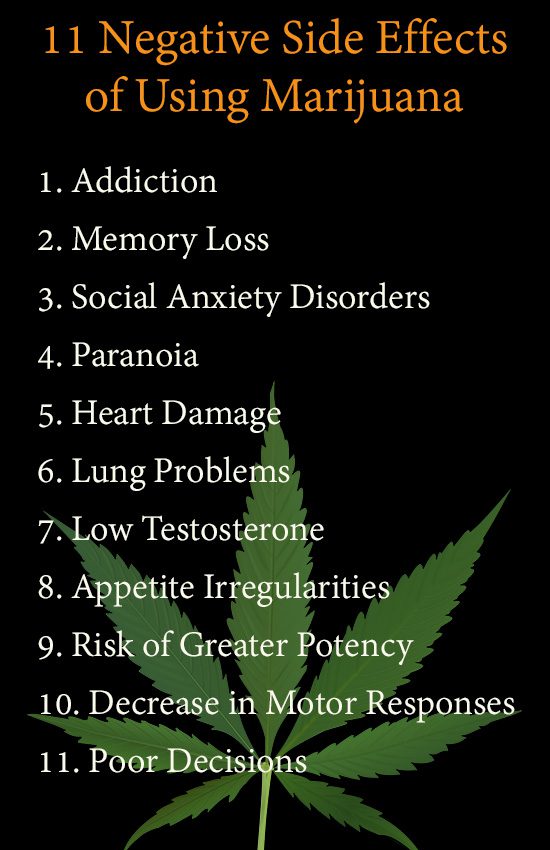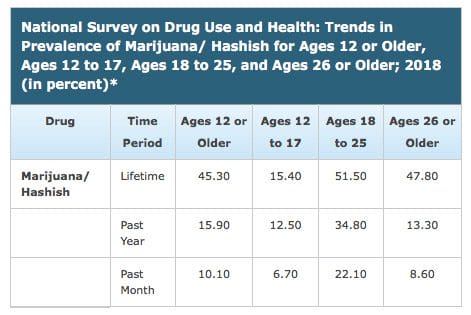The number of states with medicinal and, now, recreational marijuana laws is – no pun intended – growing. It’s therefore not surprising that with greater availability to pot, the number of people using it has spiked. Despite new state laws an avalanche of criticism and the numerous negative side effects of weed and cannabis, the Drug Enforcement Agency decided to keep marijuana listed as a Schedule I narcotic.

One major downside to this decision is the lack of information about the potential side effects of marijuana use. Because the federal government categorizes pot as having no medicinal value and a high likelihood for abuse, research grants related to weed consumption are sparse.
Even without a lot of research, though, experts do know that marijuana use is not totally consequence-free as it relates to people’s physical health and wellbeing.
What are the Side Effects of Weed and Using Marijuana?
Some of the negative effects of weed and cannabis below might be controversial to some, but each person is different and will be impacted in their own individual way.
1. Addiction
There’s long been a debate about whether pot is physically addictive and very little about whether it’s psychologically addictive.
Both are true, especially as it concerns younger, long-term users who started their habit on potent strains with high THC, the psychoactive ingredient in weed.
2. Memory Loss
A study that followed more than 3,000 American pot users over a 25-year period discovered that people who used weed on a daily basis for five years or more developed a “poorer verbal memory in middle age than people who didn’t smoke, or smoked less.”
Many users will agree that they have had bouts of not remembering something that happened at some point while high.
3. Social Anxiety Disorders
A committee appointed by the National Academies of Science, Engineering and Medicine assessed marijuana-usage data and reported that regular use can lead to mental health issues such as depression, anxiety and even schizophrenia.
4. Paranoia
A study conducted at the University of Oxford found that the psychoactive element of pot, THC, can lead users to feel a sense of paranoia as a result of the changes in their sensory perception.
Sometimes the strain of marijuana smoke can have an impact in this area, with certain strains causing more paranoia than others.
5. Heart Damage
Though the stereotype is that pot mellows people out, it can also significantly raise a person’s heart rate for up to three hours.
One study found that people who use pot are “26 percent more likely to have a stroke at some point in their lives than people who didn’t use marijuana.”
6. Lung Problems
According to the Alcohol and Drug Abuse Institute, pot has a similar range of chemicals to tobacco when smoked.
Long-term use, notes the institute, increases the risk of serious respiratory issues, such as airway inflammation, wheezing and an increase in mucus coughed up from the respiratory tract.
7. Low Testosterone
High levels of THC, found in many of the more modern strains of pot, do cause the body to produce lower levels of testosterone.
Low testosterone can lead to sluggishness, weight gain, and diminished libido among other side effects. Fortunately, testosterone levels generally return to normal when marijuana use is stopped.
8. Appetite Irregularities
Cannabinoids affect cells in the brain that have to do with appetite. These cells, which normally tell the brain that the body is full, transform and cause feelings of hunger.
This can lead to weight gain, and there’s also anecdotal evidence that regular smokers sometimes experience a lack of appetite unless they’re under the influence of THC, which can lead to weight loss.
9. Risk of Greater Potency
With lax regulations on marijuana products, certain strains of marijuana have incredibly high rates of THC compared to pot from just 20 years ago.
Between 2013 and 2014, shortly after Colorado legalized recreational weed, emergency room visits doubled, mostly as a result of potent edibles.
10. Decrease in Motor Responses
The National Institute on Drug Abuse (NIDA) reports that “marijuana significantly impairs motor coordination and reaction time,” which is a detriment, most especially while driving, but can be a factor in other types of preventable accidents as well.
11. Poor Decisions
While there’s been no recorded fatal overdose as a result of weed, there’s no question that many people think differently while “high” as opposed to when they’re sober.
This doesn’t always lead to the best decisions, whether it’s eating too much, getting behind the wheel or deciding to stay “high” all the time.
Will Marijuana Addiction Become a Problem?
While marijuana is widely recognized as being much safer when compared to alcohol and other drugs, it can still cause many of the health issues described above.
Most marijuana users will agree that they have experienced some if not many of these negative side effects of weed at any given time.
Now that marijuana is recently legal in many parts of the country, time will tell if the most debated of these side effects – addiction – will become more serious than anyone expected.

Related:
Drugged Driving Fatalities Surpass DUI Deaths for the First Time
Teens Now Smoke More Marijuana Than Cigarettes
Structural and Functional Changes in the Brain From Addiction





